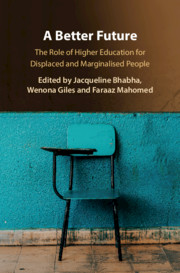Introduction
Published online by Cambridge University Press: 06 September 2020
Summary
The importance of primary and secondary education as fundamental drivers of empowerment, achievement and inclusion is widely acknowledged. So is the increasing need for higher education (HE) – education that extends beyond secondary school graduation and that delivers academic, technical or professional instruction – as an essential prerequisite for advancement in contemporary, global society.
- Type
- Chapter
- Information
- A Better FutureThe Role of Higher Education for Displaced and Marginalised People, pp. 1 - 18Publisher: Cambridge University PressPrint publication year: 2020
References
- 1
- Cited by

